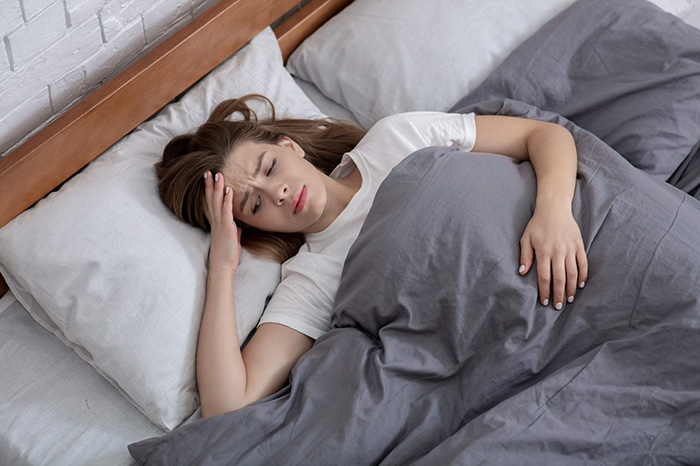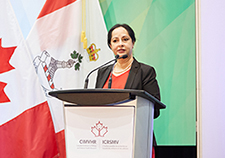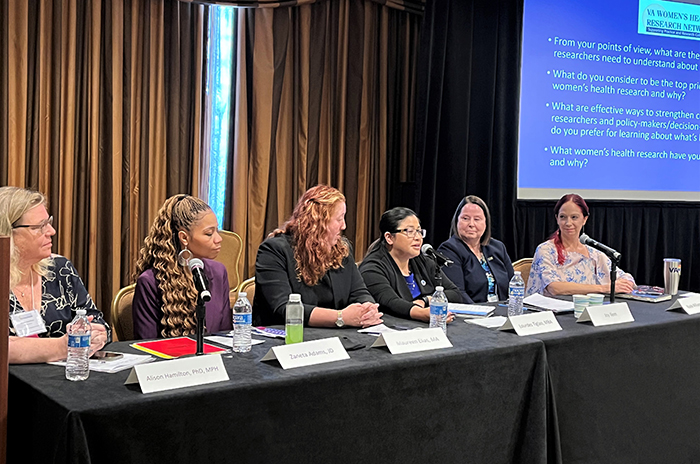Office of Research & Development |
 |


In a double-blind trial, VA researchers will compare the drugs trazodone, eszopiclone, and gabapentin to placebo for treating Veterans with PTSD who are experiencing insomnia. All three drugs contain sleep-inducing ingredients. (Photo: ©iStock/Prostock-Studio)
December 17, 2021
By Mike Richman
VA Research Communications
"Any medication group that is statistically better than the placebo group in this study will provide important support for the usefulness of that drug in the treatment of PTSD, particularly PTSD-related insomnia."
Some patients with PTSD find advantages to starting treatment with psychotherapies, such as cognitive processing therapy, or self-care approaches, such as meditation, yoga, and exercise. However, for many people, insomnia and other severe symptoms must be urgently treated because of the distress and impairment that they cause. In such cases, it may be impractical to withhold medications for the time needed to test alternatives.
That’s the word from Dr. John Krystal, a psychiatrist with VA’s National Center for PTSD. He has co-authored studies that have examined the efficacy of drugs for Veterans with chronic military-related PTSD.

Million Veteran Program director speaks at international forum

2023 VA Women's Health Research Conference

Self-harm is underrecognized in Gulf War Veterans
Currently, Krystal is leading a study that is comparing three FDA-approved drugs for their ability to treat Veterans with PTSD who have insomnia, one of the most common and hardest-to-treat symptoms for patients with that mental health condition. While there are no FDA-approved drugs for treating insomnia in this population, he says, physicians often prescribe FDA-approved medications for other clinical applications to patients with PTSD-related insomnia. These are called “off-label” prescriptions.
“Most of the Veterans in our study have suffered from PTSD and insomnia symptoms for several years,” says Krystal, who is also affiliated with the VA Connecticut Healthcare System and the Yale School of Medicine. “These Veterans continue to have symptoms despite treatments with psychotherapy and medications. It turns out that insomnia is one of the most persistent symptoms associated with PTSD, and it often fails to respond to both of the FDA-approved drugs for PTSD, sertraline and paroxetine.”
In a double-blind trial, Krystal and his team will compare the drugs trazodone, eszopiclone, and gabapentin to placebo. All three contain sleep-inducing ingredients but work in different ways. Trazodone is approved for treating depression and eszopiclone for treating insomnia. Gabapentin, an epilepsy medication, is also prescribed for such conditions as migraine headaches, pain, and mood disorders.
The researchers are aiming to recruit 1,224 Veterans from about 30 VA medical centers. The participants must have PTSD and at least moderate levels of insomnia as measured at baseline according to the Insomnia Severity Index (ISI), a questionnaire designed to assess the severity of insomnia.
Veterans who meet the inclusion criteria will be randomized within each site to receive one of the three drugs or placebo. They will take the medication every night. All four treatments will be identical in their appearance and the number of pills the Veterans take. The pills should also taste the same when first consumed.
Over the four-month study period, the participants will conduct eight in-person visits lasting 30 minutes each. They will also answer questions about themselves, their PTSD symptoms, and their quality of life. Some visits will include blood and urine tests, an electrocardiogram, or other physical exams.
The researchers plan for the four study arms to include an equal number of Veterans. However, they will do a midpoint analysis and eliminate any ineffective drugs other than placebo, before randomizing the patients to the remaining arms. That strategy increases the likelihood that the investigators will find at least one effective treatment, Krystal notes.
“We are betting on the clinical wisdom of the psychiatrists treating patients with PTSD in VA,” he says. “By testing the most widely prescribed drug classes, we think it’s likely that at least one of these medications will turn out to be sufficiently effective in order to demonstrate effectiveness in a rigorous clinical trial.”
When the study is completed, the research team will compare the responses of the patients from each treatment group. The Insomnia Severity Index will be the primary outcome measurement, with the researchers looking for the biggest statistical difference in the total ISI score from baseline to the end of four months. The Clinician Administered PTSD Scale for DSM-V (CAPS-5), considered the gold standard for assessing PTSD symptoms, will be the key secondary measurement.
“Any medication group that is statistically better than the placebo group in this study will provide important support for the usefulness of that drug in the treatment of PTSD, particularly PTSD-related insomnia,” Krystal says.
Like many other drugs, sleeping pills come with their own cluster of potential side effects. The participants in the study are being warned of these side effects, including difficulty concentrating, drowsiness, and dizziness. Thus, it’s unsafe to drive or operate heavy machinery after taking these drugs. But as Krystal sees it, the side effects are generally mild and mostly not difficult for patients to tolerate or manage with help from the research staff. Plus, there’s no specific risk that the drugs in this study will produce depression or suicidal thoughts in patients, he adds, noting albeit that depression or suicidal thoughts could emerge during the study. Both are common symptoms associated with PTSD.
“The clinical staff at the research sites are experienced clinicians, and they are prepared to help patients manage if these symptoms were to increase during the study,” he says. “Patient well-being and safety come first in research. If necessary, patients will be referred for other treatments and the study medication can be stopped.”
The three drugs in the study reduce insomnia by producing drowsiness and promoting sleep. “Fortunately, when people take these medications before going to sleep, they may awaken feeling more refreshed,” Krystal says. “This may outweigh the impact of any residual morning drowsiness.”
Understanding the complex nature of posttraumatic stress disorder, commonly known as PTSD, is one of VA’s most pressing challenges. The agency says large percentages of Veterans who fought in Vietnam, the Gulf War, and Iraq and Afghanistan have had that mental health condition sometime in their lives.
PTSD symptoms are well documented: hypervigilance, aggressive behavior, severe anxiety, guilt, insomnia, and re-experiencing trauma through flashbacks and nightmares.
Two of the symptoms used to diagnose PTSD—hyperarousal and intrusion—are directly related to sleep problems. But whether PTSD causes sleep problems or sleep problems precede PTSD is a lingering question for the medical community.
“Most people with PTSD get some sleep,” Krystal says. “But the sleep that they get may not be restful. PTSD can make it difficult to relax and fall asleep. It can also increase the likelihood of waking up in the middle of the night with distressing nightmares and waking up early in the morning unable to get back to sleep.”
Krystal explained that in embarking on the study, he and his colleagues wanted to lay the foundation for all future studies of insomnia medications for PTSD patients by evaluating drugs from the three most common medication classes prescribed off-label in VA for treating PTSD and PTSD-related insomnia. The researchers excluded prazosin and risperidone, which had been studied before but failed to show effectiveness for insomnia. “This left us with trazodone, eszopiclone, and gabapentin,” Krystal notes.
(A large VA trial on prazosin, which has been used widely in VA to help ease nightmares from PTSD, showed no effectiveness overall but suggested there may be subgroups of Veterans who benefit from the drug.)
“Our study will provide a great deal of information about the initial phase of treatment,” Krystal says. “If the results are encouraging, a longer trial might be needed to provide more definitive information about the long-term effectiveness and safety of a treatment for PTSD-In a double-blind trial, Krystal and his team will compare the drugs trazodone, eszopiclone, and gabapentin to placebo. insomnia.”
VA Research Currents archives || Sign up for VA Research updates